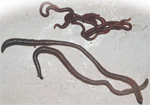Principles of Horticulture / Soil organic matter
Organic Matter in soil
Content
 |
Figure 18.1 Earthworms.
Casting worms in the
foreground eat organic
matter and soil and most
cast the waste on the
surface.
In the
background
are worms
that only eat organic
matter
which we find in
compost
heaps and
wormeries |
A typical mineral soil contains between 2 and 5 per cent organic matter.
This is made up of living organisms such as plant roots, earthworms,
insects, fungi and bacteria. On death these then decompose along with
any other organic matter that is incorporated, either naturally such as
leaves or by the addition of organic matter from elsewhere such as
compost, farmyard manure, spent mushroom compost, coir and bark.
Many of the living organisms are responsible for the decomposition
of the dead organic matter. This is eventually broken down into its
component parts becoming carbon dioxide, water, and minerals; all of
which is recycled. There also persists for a very long time a group of
organic compounds collectively known as humus.
|
Support our developers






